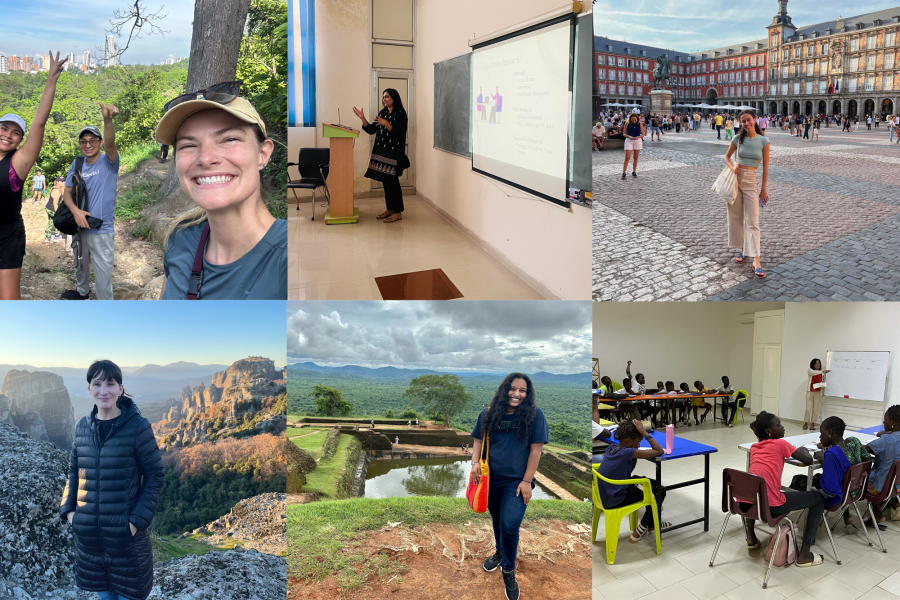For the 14th consecutive year, Johns Hopkins University was named a top producer of Fulbright U.S. Student grants, with 21 Fulbrights awarded to JHU students and alumni for the 2023-24 application cycle. Johns Hopkins had the highest percentage of winning applicants—51.2%—among all top producing institutions in the doctoral-granting institutions category for student grants.
The Fulbright program is among the largest and most diverse exchange programs in the world, supporting approximately 9,000 merit-based scholarships in the United States and 160 countries for accomplished students, scholars, teachers, artists, and professionals of all backgrounds and fields. The Fulbright U.S. Student Program supports roughly 2,000 recent graduates, graduate students, and early-career professionals each year who pursue graduate study, conduct research, or teach English abroad.
The Hub caught up with some of our current Fulbright grantees to learn how they're using their awards to exchange ideas and address complex global challenges.
Baldeep Dhaliwal
BSPH; Third year PhD candidate in the Department of International Health.
Grant type: Research.
Location: Panjab University, Chandigarh, India.
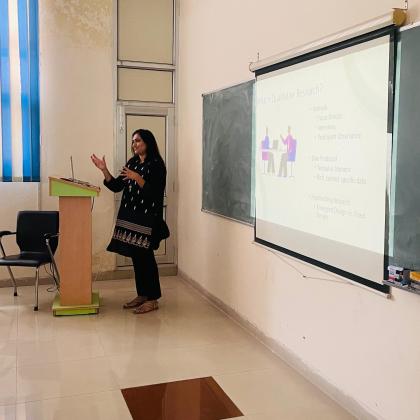
Image caption: Baldeep giving a lecture at Panjab University on Qualitative Research
"I collaborated with Dr. Madhu Gupta at the Post Graduate Institute of Medical Education and Research, Chandigarh, as well as Dr. Anuradha Nadda at the Dr. BR Ambedkar State Institute of Medical Sciences. My research aims to provide essential, multi-pronged data to guide conversations, support advocacy efforts, and potentially facilitate policy change within the urban Accredited Social Health Activists (ASHA) program in Punjab, India. ASHAs, a type of community health worker, support the government in meeting health objectives and contributing to the health of urban communities. I chose to pursue this research because there is unprecedented interest in the urban health care system in India but extremely limited data. I am hopeful my project may provide better understanding of broad, complex issues of health delivery among marginalized urban populations, both in India and beyond.
"For me, the most rewarding experience was spending so much time with the ASHAs—visiting their homes for birthdays and holidays, laughing and enjoying their hospitality and company. This really gave me the chance to integrate and fully participate in their society. I also really enjoyed getting to make stronger connections with researchers in India—I am so grateful that I was able to work closely with Dr. Anuradha and Dr. Madhu. They were amazing mentors to me, and it is incredibly special to continue those relationships."
Ella Gonzalez
KSAS, PhD candidate in History of Art
Grant type: Research
Location: American School of Classical Studies, Athens
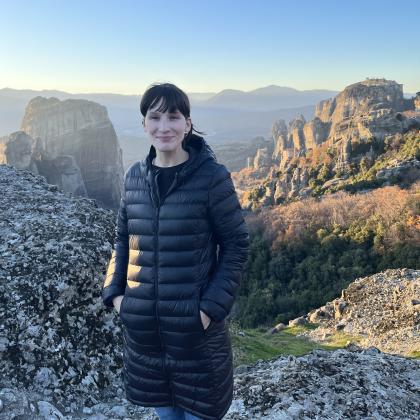
Image caption: Ella visiting Meteora, Greece
"I am researching and writing my dissertation on caryatids, or female architectural supports, in ancient Greece. My project looks at these figures on bronze mirror handles and various architectural case studies throughout the Greek mainland through a feminist lens in relation to women's labor in antiquity by taking a contextualized and gender-specific approach to these objects. My project firmly grounds the study of ancient women in art history and challenges conventional readings of women in antiquity. The caryatid motif spans from ancient times to the present and is relevant and exciting because of its presence across cultures and time. Revising our understanding of ancient caryatids is essential to how we engage with and see these figures, and women's labor, in the present.
"The most rewarding part has been living and working in a culturally vibrant and caring country and community. In addition to my research, which involves hunkering for hours in libraries and museums, I also volunteer at a non-profit, Action for Women, that helps refugee and asylum-seeking women experiencing gender-based violence. As I am deeply interested in women/gender in the ancient Greek world through the lens of art history, it has been incredibly meaningful to make sure I am connected to the current lived realities of women in Greece. Moreover, through Modern Greek lessons and engagement with the vibrant literary, arts, and music scenes in Athens, I can genuinely say that the people here are some of the kindest and most welcoming individuals I have had the pleasure of meeting."
Ellen Cannon
SoE '23, Master's in Educational Studies
Grant type: Teaching
Location: The Industrial University of Santander, Bucaramanga, Colombia
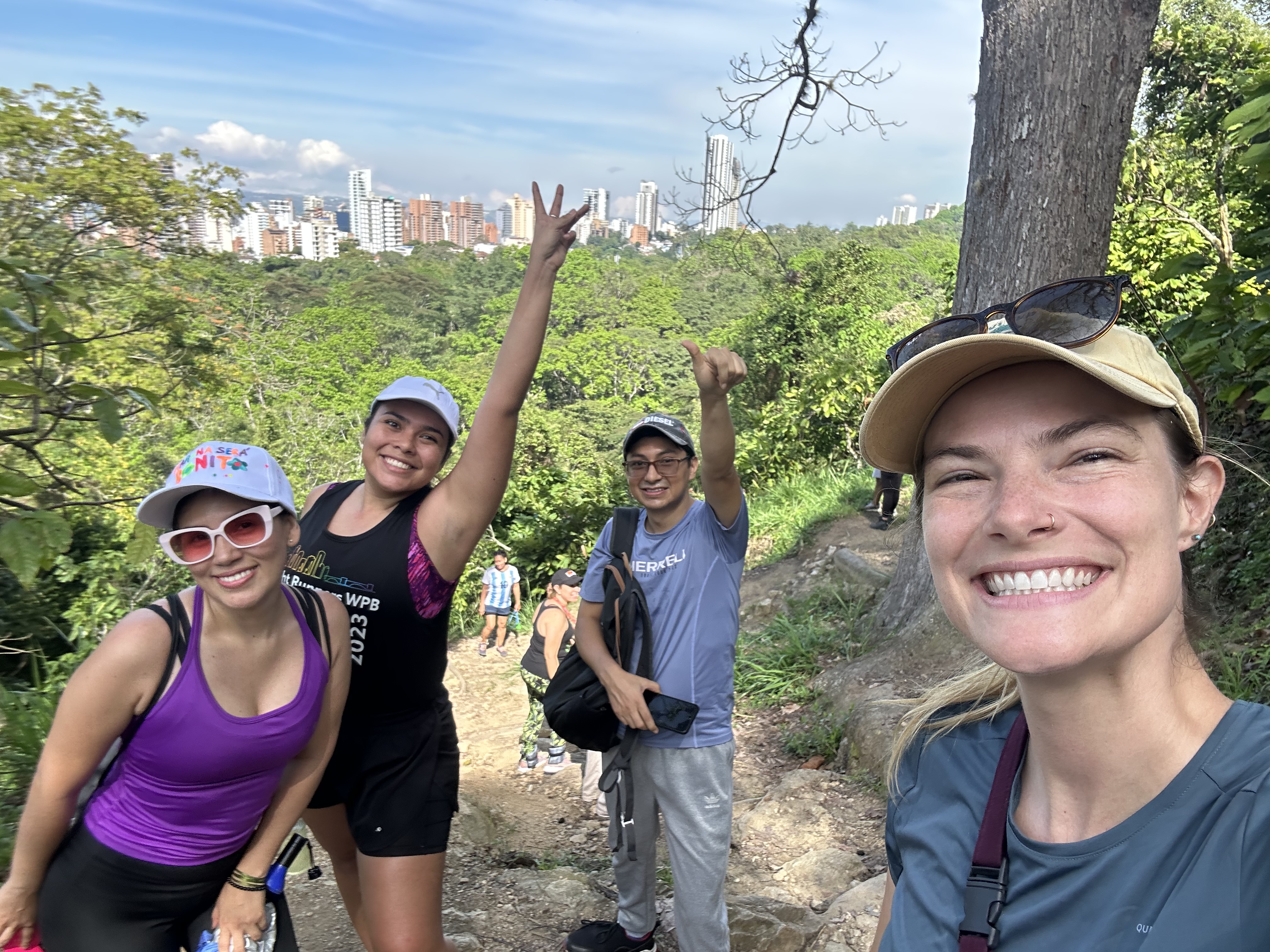
Image caption: Ellen Cannon, pictured in front, enjoys a hike in Colombia
"I work with a department at the university called the Vicerrectoría de Investigación y Extensión, which handles administrative work like managing students' and professors' research projects and external research partnerships with international universities. In my role, I support student employees of the university by teaching two English workshops a day, in which we practice English reading, writing, listening, and speaking. I also support professors and students with their research by helping them revise their research papers that have been translated into English. Outside of the university, I volunteer with an organization called Ciclaramanga, a non-profit that promotes cycling culture in Bucaramanga by hosting cycling events, renting out bicycles cheaply to the public, and advocating for more cycling infrastructure in the city. As a volunteer, I help plan events and volunteer at the bicycle rental stand. Outside of my work and volunteering, I also take salsa classes a few times a week and enjoy exploring through hiking trips.
"The most rewarding part of my experience so far has been seeing my students grow and become more confident in their English skills. I have also really enjoyed the cultural exchange aspect of the Fulbright program. Sometimes I will focus classes on learning English by teaching my students about United States holidays, music, or culture, and it's always really interesting and fun to discuss my students' perspectives on how our countries are similar and different. Another rewarding part of this experience has been exploring all the different regions and cultures within Colombia. Colombia is a hugely diverse country, and it's been a privilege to be able to see so many parts of it and meet so many people from different areas of the country."
Hanan Abdellatif
KSAS; BA in History, minor in Spanish language and Hispanic culture
Grant type: Teaching
Location: IE University, Madrid, Spain
Image caption: Hanan in Madrid's historic city center
"My teaching assignment consists of two main responsibilities. The first is my work at the IE University Writing Center, where I help undergraduate and graduate students develop their writing skills. In one-on-one appointments, I work with students on a variety of types of writing, including theses, essays, personal statements, cover letters, and research papers. I spend about half of my time at IE in the Writing Center. My other main responsibility is my work as a teaching assistant in the classroom. This semester, I am collaborating with Dr. Patrick Sullivan de Oliveira in his class, Technology and the Making of the Modern World. In my role as teaching assistant, I facilitate class discussions, create short presentations on primary sources, and aid Professor Oliveira in developing in-class activities.
"I also participate in two side projects. I volunteer a few times per week as an assistant coach to the Dragones de Lavapiés senior (refugiados) club soccer team. The mission of the club is to foster respect and community between individuals of various national and cultural backgrounds within Lavapiés (the neighborhood in Madrid where I live), while providing opportunities for the community to participate in competitive soccer. I also volunteer at the International Institute Library, leading a book club for tweens (ages 8-11 and 11-14) once a month. Together, we read short stories accompanied by their adaptations in visual media like comic books and movies.
"The most rewarding part of my experience so far has been the people I have met. From my Fulbright coworkers, IE supervisor, and Professor Oliveira, to my roommates, I've had the opportunity to bond with so many emotionally intelligent and open-minded people from around the world. I've also been able to further develop my Spanish skills through my side projects and cultural immersion. Madrid is a city full of life, and there is no shortage of access to events, museums, shows, art, and Spanish as well as non-Spanish culture at no cost to young people and students."
Shaniya Ma
BSPH '23; ScM in Infectious Disease Epidemiology
Grant type: Research
Location: University of Kelaniya, Mount Lavinia, Sri Lanka
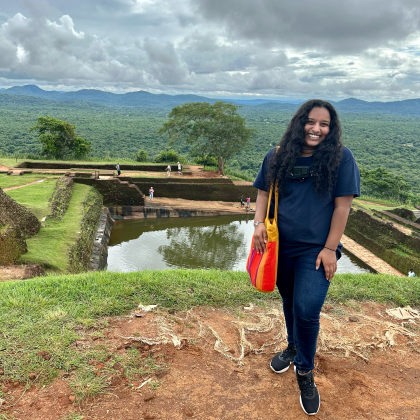
Image caption: Shaniya at the top of Sigiriya, an ancient fortress in Sri Lanka
"I have a strong interest in working on neglected tropical diseases, so my research project is centered on dengue, a mosquito-borne disease prevalent in Sri Lanka. The focus of my project is to assess the effectiveness of the country's dengue control program, specifically identifying gaps and proposing recommendations for program enhancement. The project comprises two main components: 1) a community knowledge aspect, which evaluates people's knowledge, attitudes, and practices concerning dengue, in addition to the preventive measures they do/don't engage with and why, and 2) a stakeholder component involving interviews with clinicians, medical officers, administrators, vector control experts, etc. This segment aims to explore the existing dengue prevention initiatives, gather insights on perceived gaps in the program, and seek recommendations for future improvements.
"The most fulfilling aspect of this experience has been interacting with the communities. We witness firsthand the gaps in dengue knowledge, but it's evident that these individuals are eager to understand dengue better and take necessary steps to safeguard themselves and their families. It's incredibly gratifying to realize our efforts are making a meaningful impact by empowering people to protect themselves and their families from the disease. I love when they ask us for more information and are excited to learn more."
Noa Vineberg
KSAS '23; BA in English and classics
Grant type: Teaching
Location: Thiès, Senegal
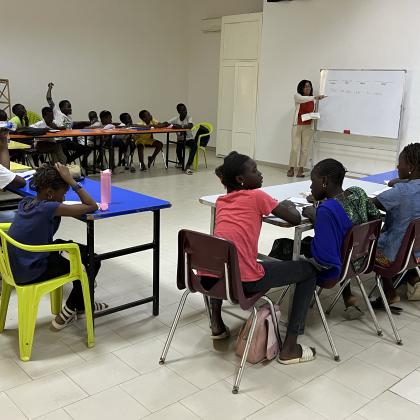
Image caption: Noa teaching at American Corner Thiès
"I work at the American Corner Thiès, which is located in a cultural center and run by the U.S. Embassy. My fellow English teaching assistant and I run a number of activities at the center, including a conversation club where we discuss national/international holidays and current events, a book club, and an "English Exploration" activity for children aged 10-18. Additionally, we assist with twice-weekly English language classes for adults.
"Thus far the most rewarding part of my experience has been the new relationships I have formed with my coworkers, community members, and other grantees, as well as the cultural exchange that has come through learning Wolof (the lingua franca in Senegal)!"
At Johns Hopkins, the National Fellowships Program helps students and recent graduates apply for Fulbright Study/Research Awards and the Fulbright English Teaching Assistant Awards. Representatives from the office closely advise candidates on all parts of the application. Information on Fulbright student grants and the campus advising process is available on the NFP website.
Posted in University News
Tagged fulbright scholars




